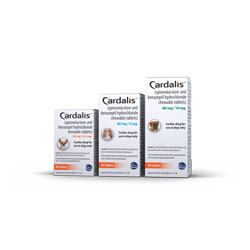Cardalis Chewable Tablets
+ Save on each recurring order!
NEW Cardiac Drug for Dogs by Ceva!
Veterinarian Prescription (Rx) Required
Free Shipping on orders over $75
Low Price Match Guarantee
- spironolactone/benazepril hydrochloride chewable tablets
- Management of clinical signs of mild, moderate, or severe congestive heart failure in dogs due to atrioventricular valvular insufficiency (AVVI)
- Unique combination
- Greater efficacy compared to benazepril alone
Description
CARDALIS is indicated with concurrent therapy (e.g. furosemide, etc.) for the management of clinical signs of mild, moderate, or severe
congestive heart failure in dogs due to atrioventricular valvular insufficiency (AVVI) in dogs only. CARDALIS™ (spironolactone and benazepril hydrochloride chewable tablets) for dogs contains two active ingredients, spironolactone and benazepril hydrochloride, in a fixed ratio of 8:1 respectively. CARDALIS is supplied as oblong half scored flavored chewable tablets in three sizes: 20 mg spironolactone and 2.5 mg benazepril hydrochloride, 40 mg spironolactone and 5 mg benazepril hydrochloride, and 80 mg spironolactone and 10 mg benazepril hydrochloride.
Dosage and Administration
CARDALIS administration should begin after pulmonary edema is stabilized. CARDALIS should be administered orally once daily at a dose of 0.9 mg/lb (2 mg/kg) spironolactone and 0.11 mg/lb (0.25 mg/kg) benazepril hydrochloride, according to dog body weight using a suitable combination of whole and/or half tablets. All tablet strengths are scored and the calculated dosage according to dog’s weight should be to the nearest half-tablet increment. CARDALIS should be administered with food.
Contraindications
Do not administer CARDALIS in conjunction with non-steroidal anti-inammatory drugs (NSAIDs) in dogs with renal insu‑ciency. Do not administerCARDALIS to dogs with hypoadrenocorticism (Addison’s Disease), hyperkalemia, or hyponatremia. Do not administer CARDALIS to animals with known hypersensitivity to ACE inhibitors or spironolactone.
Warnings
Keep CARDALIS in a secure location out of reach of dogs, cats, and other animals to prevent accidental ingestion or overdose. In case of accidental overdose, induce vomiting, lavage the stomach (depending on risk assessment), and monitor electrolytes. Symptomatic therapy (e.g. –uid therapy) should be provided as medically necessary. CARDALIS is only for use in dogs with clinical evidence of heart failure.
Human Warnings
Not for use in humans. Keep this and all medications out of the reach of children. Consult a physician in case of ingestion by humans.
Precautions
The safety and effectiveness of concurrent therapy of CARDALIS with pimobendan has not been evaluated. Renal function and serum potassium levels should be evaluated prior to initiating treatment with CARDALIS. Regular monitoring of renal function and serum potassium levels is recommended as there may be an increased risk of hyperkalemia. Dogs undergoing combined treatment with CARDALIS and NSAIDs should be adequately hydrated to avoid renal toxicity. Concomitant use of desoxycorticosterone pivalate (DOCP) with spironolactone may counter the effect of DOCP as DOCP has an opposing mechanism of action to potassium-sparing diuretics like spironolactone. Closely monitor dogs receiving digoxin and spironolactone. Spironolactone decreases digoxin elimination and hence raises digoxin plasma concentration. This may result in digoxin toxicity. Spironolactone and benazepril hydrochloride undergo extensive hepatic biotransformation. Care should be taken when using CARDALIS in dogs with hepatic dysfunction. The safety of CARDALIS has not been evaluated in growing dogs. Spironolactone has an antiandrogenic effect and should be used with caution in growing dogs. The safety of CARDALIS has not been established in pregnant, lactating or breeding dogs.
Storage Information
Store at controlled room temperature, 20° to 25°C (68° to 77°F), in original container. Excursions permitted between 15°C and
30°C (between 59° and 86°F).
How Supplied
CARDALIS chewable tablets for dogs are available in 3 sizes of oblong half scored flavored tablets: 20 mg spironolactone and 2.5 mg benazepril hydrochloride, 40 mg spironolactone and 5 mg benazepril hydrochloride, and 80 mg spironolactone and 10mg benazepril hydrochloride. Each size is available in 30-count bottles enclosed in color coded packages.
CARDALIS is indicated with concurrent therapy (e.g. furosemide, etc.) for the management of clinical signs of mild, moderate, or severe
congestive heart failure in dogs due to atrioventricular valvular insufficiency (AVVI) in dogs only. CARDALIS™ (spironolactone and benazepril hydrochloride chewable tablets) for dogs contains two active ingredients, spironolactone and benazepril hydrochloride, in a fixed ratio of 8:1 respectively. CARDALIS is supplied as oblong half scored flavored chewable tablets in three sizes: 20 mg spironolactone and 2.5 mg benazepril hydrochloride, 40 mg spironolactone and 5 mg benazepril hydrochloride, and 80 mg spironolactone and 10 mg benazepril hydrochloride.
Dosage and Administration
CARDALIS administration should begin after pulmonary edema is stabilized. CARDALIS should be administered orally once daily at a dose of 0.9 mg/lb (2 mg/kg) spironolactone and 0.11 mg/lb (0.25 mg/kg) benazepril hydrochloride, according to dog body weight using a suitable combination of whole and/or half tablets. All tablet strengths are scored and the calculated dosage according to dog’s weight should be to the nearest half-tablet increment. CARDALIS should be administered with food.
Contraindications
Do not administer CARDALIS in conjunction with non-steroidal anti-inammatory drugs (NSAIDs) in dogs with renal insu‑ciency. Do not administerCARDALIS to dogs with hypoadrenocorticism (Addison’s Disease), hyperkalemia, or hyponatremia. Do not administer CARDALIS to animals with known hypersensitivity to ACE inhibitors or spironolactone.
Warnings
Keep CARDALIS in a secure location out of reach of dogs, cats, and other animals to prevent accidental ingestion or overdose. In case of accidental overdose, induce vomiting, lavage the stomach (depending on risk assessment), and monitor electrolytes. Symptomatic therapy (e.g. –uid therapy) should be provided as medically necessary. CARDALIS is only for use in dogs with clinical evidence of heart failure.
Human Warnings
Not for use in humans. Keep this and all medications out of the reach of children. Consult a physician in case of ingestion by humans.
Precautions
The safety and effectiveness of concurrent therapy of CARDALIS with pimobendan has not been evaluated. Renal function and serum potassium levels should be evaluated prior to initiating treatment with CARDALIS. Regular monitoring of renal function and serum potassium levels is recommended as there may be an increased risk of hyperkalemia. Dogs undergoing combined treatment with CARDALIS and NSAIDs should be adequately hydrated to avoid renal toxicity. Concomitant use of desoxycorticosterone pivalate (DOCP) with spironolactone may counter the effect of DOCP as DOCP has an opposing mechanism of action to potassium-sparing diuretics like spironolactone. Closely monitor dogs receiving digoxin and spironolactone. Spironolactone decreases digoxin elimination and hence raises digoxin plasma concentration. This may result in digoxin toxicity. Spironolactone and benazepril hydrochloride undergo extensive hepatic biotransformation. Care should be taken when using CARDALIS in dogs with hepatic dysfunction. The safety of CARDALIS has not been evaluated in growing dogs. Spironolactone has an antiandrogenic effect and should be used with caution in growing dogs. The safety of CARDALIS has not been established in pregnant, lactating or breeding dogs.
Storage Information
Store at controlled room temperature, 20° to 25°C (68° to 77°F), in original container. Excursions permitted between 15°C and
30°C (between 59° and 86°F).
How Supplied
CARDALIS chewable tablets for dogs are available in 3 sizes of oblong half scored flavored tablets:
20 mg spironolactone and 2.5 mg benazepril hydrochloride, 40 mg spironolactone and 5 mg benazepril hydrochloride, and
80 mg spironolactone and 10mg benazepril hydrochloride. Each size is available in 30-count bottles enclosed in color coded packages.







